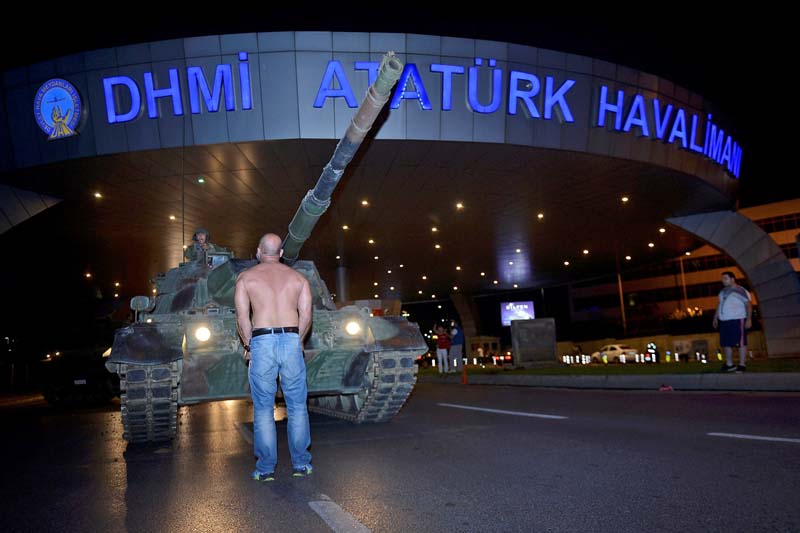Turkey troops say they seize power; crowds answer Erdogan call to defy them
Turkish troops said on Friday they had seized power but President Tayyip Erdogan vowed that the attempted coup would be put down and crowds answered his call to defy a curfew order and take to the streets to support him.
Gunfire and explosions rocked both the main city Istanbul and capital Ankara in a chaotic night, but by the early hours of Saturday there were indications that the coup was crumbling.
If successful, the overthrow of Erdogan, who has ruled Turkey since 2003, would mark one of the biggest shifts in the Middle East in years, transforming one of the most important US allies while war rages on its border. If it fails, the coup attempt could still destabilise a pivotal country in the region.
"We will overcome this," Erdogan said, speaking on a video call to a mobile phone held up to the camera by an announcer on the Turkish sister station of CNN. He called on his followers to take to the streets to defend his government and said the coup plotters would pay a heavy price.
An official said Erdogan was speaking from Marmaris on the Turkish coast where he was on holiday. A Turkish official later said Erdogan's plane had landed in Istanbul.
A Turkish military commander said fighter jets had shot down a helicopter used by the coup plotters over Ankara. State-run Anadolu news agency said 17 police were killed at special forces headquarters there.
As the night wore on, crowds appeared to be answering Erdogan's call to take to the streets, defying orders by the coup leaders to stay indoors.
"We have a prime minister, we have a chief of command, we're not going to leave this country to degenerates," shouted one man, as groups of government supporters climbed onto a tank near Istanbul's Ataturk airport.
Prime Minister Binali Yildirim and other senior officials said the elected government remained in office. Yildirim and other officials blamed loyalists of a US-based cleric for the coup attempt; his movement denied any part in it.
The United States declared its backing for Erdogan's government. Secretary of State John Kerry said he phoned the Turkish foreign minister and emphasised "absolute support for Turkey's democratically elected, civilian government and democratic institutions".
Crowds of people, some waving Turkish flags, gathered in major squares in Istanbul and Ankara to show support for the elected government. Police urged people to leave Istanbul's Taksim square, warning military aircraft could open fire.
Warplanes and helicopters roared over Ankara and Reuters reporters saw a helicopter open fire. Anadolu said military helicopters had fired on the headquarters of the intelligence agency.
Reuters journalists saw tanks open fire near the parliament building in Ankara, which they had surrounded. Anadolu later said a bomb hit the building. Smoke rose up from nearby, Reuters witnesses said. An opposition MP told Reuters parliament was hit three times and that people had been wounded.
In the first hours of the coup attempt, airports were shut, access to internet social media sites was cut off, and troops sealed off the two bridges over the Bosphorus in Istanbul, one of which was still lit up in red, white and blue in solidarity with victims of the truck attack in France the previous day.
Soldiers took control of TRT state television, which announced a countrywide curfew and martial law. An announcer read a statement on the orders of the military that accused the government of eroding the democratic and secular rule of law. The country would be run by a "peace council" that would ensure the safety of the population, the statement said.
Shortly afterwards, TRT went off the air. It resumed broadcasting in the early hours of Saturday.
Anadolu said the chief of Turkey's military staff was among people taken "hostage" in the capital Ankara, but Yildirim later said he was back in control. CNN Turk also reported that hostages were being held at the military headquarters.






